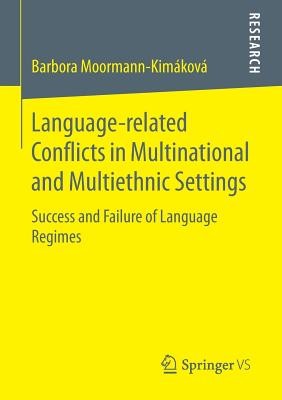
- We will send in 10–14 business days.
- Author: Barbora Moormann-Kimáková
- Publisher: Springer vs
- Year: 2015
- Pages: 278
- ISBN-10: 3658111747
- ISBN-13: 9783658111748
- Format: 14.8 x 21 x 1.7 cm, minkšti viršeliai
- Language: English
- SAVE -10% with code: EXTRA
Language-Related Conflicts in Multinational and Multiethnic Settings (e-book) (used book) | bookbook.eu
Reviews
Description
In this book, Barbora Moormann-Kimáková analyses the possibility of finding an optimal language regime in multinational and multiethnic countries - either by defining the contents of an optimal language regime, or with the help of a criterion enabling to evaluate whether a language regime is optimal or not. The process of the selection or change of a language regime often becomes a matter of a language-related conflict. These conflicts are mostly accompanied by other political or social conflicts, as for example in Ukraine or former Yugoslavia, which render solutions - and their evaluation - difficult. The author claims that language regimes can be evaluated based on the increase or lack of their legitimacy in the eyes of the relevant actors. This is demonstrated in four language regime studies on the European Union, Soviet Union, Bosnia and Herzegovina, and South Africa.
EXTRA 10 % discount with code: EXTRA
The promotion ends in 21d.03:46:19
The discount code is valid when purchasing from 10 €. Discounts do not stack.
- Author: Barbora Moormann-Kimáková
- Publisher: Springer vs
- Year: 2015
- Pages: 278
- ISBN-10: 3658111747
- ISBN-13: 9783658111748
- Format: 14.8 x 21 x 1.7 cm, minkšti viršeliai
- Language: English English
In this book, Barbora Moormann-Kimáková analyses the possibility of finding an optimal language regime in multinational and multiethnic countries - either by defining the contents of an optimal language regime, or with the help of a criterion enabling to evaluate whether a language regime is optimal or not. The process of the selection or change of a language regime often becomes a matter of a language-related conflict. These conflicts are mostly accompanied by other political or social conflicts, as for example in Ukraine or former Yugoslavia, which render solutions - and their evaluation - difficult. The author claims that language regimes can be evaluated based on the increase or lack of their legitimacy in the eyes of the relevant actors. This is demonstrated in four language regime studies on the European Union, Soviet Union, Bosnia and Herzegovina, and South Africa.


Reviews